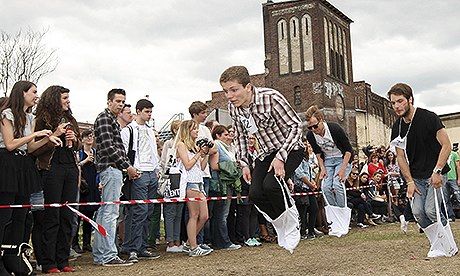The Guardian newspaper asked me to write this short piece about getting media work.
Getting Media Work: Recruiter Insights
Winning your first job in media is tough; it’s a highly competitive sector. At Napoleon Creative, we recently received more than 250 applications for one graduate opening, and it was my job to sift through them, weeding out the weaker CVs, leaving around 40 to re-read thoroughly with the team. So how can you write a CV that survives that first cull?
When I’m recruiting, submission is usually via email and I wait for a good number of CVs to come in before I start reviewing. Initially I just read the opening sentence of the covering email. That opening sentence is important.
For me, a formal tone doesn’t work; my eyes just scan over it and I lose interest in the application quickly:
Dear Sir/Madam,
I am writing to apply for the researcher position you have advertised.
I prefer openings which feel like I’m being talked to as a human, rather than a human resources robot. Try a warm, personal tone to your opening paragraph, as though you were meeting the person face-to-face:
Dear Sir/Madam,
I hope you are well. My name is Anna and, as a recent English literature graduate who has spent the last three years writing about apocrypha in Hamlet and tinkering about on Photoshop, I’m writing to apply for the researcher position at Napoleon Creative.
My initial scan is always on screen, so your email is competing with everything else going on in my day: a script I’m writing, an edit I’m reviewing and chats on Skype with clients about changes to their projects. So keep your CV visually clean and simple, with space between each section so it feels like a relief from the rest of the clutter on my computer screen.
Younger applicants tend to throw in too much detail, leading to a dense document cluttered with irrelevancies. It’s better to have a lean, one-page CV than two pages of filler for me to struggle through.
Join my next media CV workshop
Chequered Careers
Media applicants also tend to have chequered careers, changing jobs regularly as they move between projects and working in a variety of roles. A compelling personal statement at the top of a CV that brings all this experience into a coherent description of you and your career aspirations, often works well.
The first sentence should introduce the role you’re looking for or the vacancy, if you’re responding to a specific advert. Next describe what experience you’ve gained to help you in that role, and finally write a sentence to show that you’re quietly confident, responsible, alert and willing to take on whatever task the job requires.
Finish with a little about your ambitions, remembering to be clear that you don’t expect to get there at lightning speed. For instance: “I eventually want to be a producer, so I’m looking for production assistant roles to lay down a good foundation of experience first.”
You need to communicate that you can work well with others, but don’t rely on simply stating: “I can work as part of a team” – a cliché long overdue for retirement.
Instead, demonstrate where you’ve worked in a team, even if it was in part-time work while studying. For example: “I was one of seven shop floor staff, we worked as a team to make sure all customers were given the help they needed.” You could also demonstrate this by including a group activity in a section about your interests.
Writing a covering letter for getting media work
When you write your covering letter, you should never claim to be the perfect candidate. For me, that is the kiss of death. Being the perfect candidate is not just about ticking all the requirement boxes, it’s also about how you fit into the company.
So instead of saying you’re the best person for the job, try this subtly different, more modest opening line: “I am excited to be applying for this role. Not only do the requirements match my skills and experience, but I am confident that this is a job I would really enjoy.” This way, you’re saying you have the right skills, but you’ve left it to the employer to decide whether you’re right for the team.
Think of the application process as the beginning of a conversation between you and the employer. Creative organisations tend to be informal in the way they talk to each other, so if your CV and covering letter have a friendly but professional tone of voice – as though you’d just met your next boss in person – your application will come to life. The more human and approachable your application, the more they’ll want to meet you in person. That’s one of the tricks to getting media work.
For more tips read my Clearly Creative CVs book

